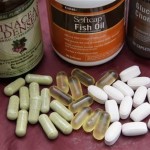Supplement advertisements like to use the words “safe” and “natural” in the same sentence. For example, most of us have heard the phase “a safe, natural alternative” to describe the effects of a variety of supplements. While true, most supplements on the market are indeed safe, it's incorrect to assume that just because something natural that it automatically has to be safe for everybody.
Who should avoid supplements?
As a general rule, pregnant women should avoid most supplements unless they are prescribed by their physician (e.g. prenatal vitamins). The reason for this is that few scientific studies have gauged the safety or effectiveness of nutritional supplements in pregnant woman.
This is for ethical reasons, of course. In other words, it's unethical to recruit pregnant women and expose them to a product/supplement which might turn out to be harmful to them and their unborn children.

AP Photo Eric Risberg
Similarly, minors – children and teenagers – are another group who are often cautioned against using nutritional supplements. The reasons are the same as for pregnant women. Little supplement research is ever conducted on children or teenagers.
It's also unethical to conduct research on individuals (minors) who cannot legally accept the risks that may be involved in research and who may not fully understand the consequences of their participation in research.
Remember, children are not miniature adults. In other words, the results obtained from supplement studies using adults does not automatically mean the same results would be found if children used the same supplement.
People with medical conditions are also usually cautioned against using nutritional supplements. While various studies over the years have found that some supplements may help those with various medical conditions, the truth is that for the most part, we just do not yet fully understand how supplements interact with disease states.
The risks of using ephedra if you have heart or kidney disease or high blood pressure is well documented. However, interaction – both positive and negative – of many other supplements is less clear.
For example, many well known supplements -like vitamin K, fish oil, vitamin E, ginkgo and more – can interact with blood thinner medications, rendering the medication either less potent or more potent.
A very short list of some popular supplements that might have drug interactions include but not limited to
| Red yeast rice | Glucosamine |
| Yohimbe | Chondroitin |
| Grapefruit | Ginkgo |
SupplementClarity.comSee my site for unbiased supplement reviews
When in doubt, don't assume that natural products have to be safe -or safe for everybody. When in doubt, speak to your doctor if you are pregnant, have any health issues or are below the age of 18, just to be safe.
Leave a Reply